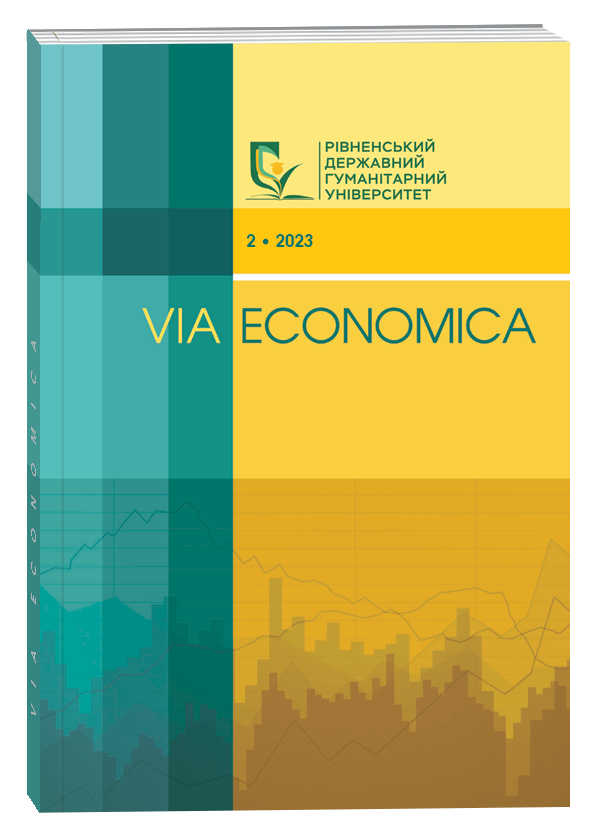CONCEPTUAL FOUNDATIONS OF CREATIVE ACCOUNTING
Abstract
The need for complex research in the field of creative accounting has been grounded. A conceptual model of creative accounting as an element of accounting science has been developed. It includes the following elements: the role in the system of accounting knowledge; level of application; subject; object; subjects of implementation; types, methods; strategic objectives for implementation; definition. The boundaries of the use of the concept of "creative accounting" (within the current accounting legislation; with the complete absence of regulatory regulation) have been defined. It is suggested to consider creative accounting as a direction of the science of accounting, involving the use of creative approaches in the process of accounting and reporting (financial and additional forms) on financial condition and results of the company's activities. On the basis of the development of the justification for the influence of creative accounting on the reliability of accounting information and the allocation of areas for the implementation of creative accounting in relation to accounting legislation, the reasons for the existence of differences in the views of scientists to understand the essence of creative accounting have been defined. On the basis of a study of the existing practice of using creative accounting in the activities of enterprises the necessity of distinguishing two basic types of creative accounting has been grounded. Accounting engineering is a set of management actions aimed at ensuring the compliance of the enterprise's economic activities with its strategic goals and management requirements. The relationship between accounting engineering and the accounting policy of the enterprise on the basis of justification of the methodology for its implementation has been determined. Two main groups of methods for the implementation of creative accounting (substantive and formal) have been allocated.
References
Голов С.Ф. Бухгалтерський облік в Україні: аналіз стану та перспективи розвитку : монографія. Київ : Центр учбової літератури, 2007. 522 с.
Голов С.Ф. Креативний облік: творчість чи шахрайство? «Економічні науки». – Серія «Облік і фінанси». 2010. Випуск 7 (25). Ч. 1. С. 360–367.
Кантаєва О.В. Історичні аспекти і сучасні підходи до розгляду значення креативного обліку в Міжнародних стандартах фінансової звітності. Вісник університету банківської справи НБУ. 2013. № 3 (18). С. 215–221.
Канцедал Н.А., Пономаренко О.Г. Про базові принципи господарського обліку в підготовці фахівців. Наукові праці Полтавської державної аграрної академії. Вип. 1. Т. 1. Економічні науки.–2010. С. 89–93.
Кравченко М.А. Розвиток призначення креативного обліку в міжнародних стандартах фінансової звітності. Науковий вісник Херсонського державного університету. 2015. Випуск 14. Частина 3. С. 152–157.
Куцинська М.В. Аналіз сутності та існуючих видів креативного обліку. Глобальні та національні проблеми економіки. 2015. Випуск 3. С. 895–898.
Легенчук С.Ф. Креативний облік в національній системі бухгалтерського обліку. Міжнародний збірник наукових праць. Теорія та методологія бухгалтерського обліку, контролю і аналізу. 2009. Випуск 2(14). С. 88–101.
Мэтьюс М.Р. Теория бухгалтерського учета : учебник / М.Р. Мэтьюс, М.Х.Б. Перера ; пер. с англ., под. ред. Я.В. Соколова, И.А. Смирновой. М. : Аудит, ЮНИТИ, 1999. 663 с.
Ткач В.И., Шумейко М.В., Ткач В.С. Бухгалтерский инжиниринг. Авторское Мнение. Дискуссии. 2015. № 4. С. 7–15.
Amat O. The ethics of creative accounting / Oriol Amat, John Blake, Jack Dowds. URL: https://core.ac.uk/download/pdf/6475312.pdf.
Fridson M. Is Non-GAAP Reporting Hurting Your Portfolio? / Martin Fridson. URL: https://www.forbes.com/sites/investor/2016/11/28/is-non-gaap-reporting-hurting-your-portfolio/#b3bc92b16c78.
Stangova N., Vіghova A. Possibilities of creative accounting avoidance in the Slovak Republic. Economic Annals-XXI. 2016. Vol. 158(3-4(2)). P. 97–100.
Herve Stolowy, Gaetan Breton. Accounts Manipulation: A Literature Review and Proposed Conceptual Framework. Review of Accounting and Finance. 2004. Vol. 3 (1). P. 5–92.
Holov S.F. (2007). Bukhhalterskyi oblik v Ukraini: analiz stanu ta perspektyvy rozvytku: monohrafiia. Kyiv: Tsentr uchbovoi literatury, 522 р.
Holov S.F. (2010). Kreatyvnyi oblik: tvorchist chy shakhraistvo? "Ekonomichni nauky". Seriia "Oblik i finansy", vol. 7 (25), сh. 1, рр. 360–367.
Kantaieva O.V. (2013). Istorychni aspekty i suchasni pidkhody do rozghliadu znachennia kreatyvnoho obliku v Mizhnarodnykh standartakh finansovoi zvitnosti. Visnyk universytetu bankivskoi spravy NBU, no. 3 (18), рр. 215–221.
Kantsedal N.A., Ponomarenko O.H. (2010). Pro bazovi pryntsypy hospodarskoho obliku v pidhotovtsi fakhivtsiv. Naukovi pratsi Poltavskoi derzhavnoi ahrarnoi akademii, vol. 1, t. 1, Ekonomichni nauky, рр. 89–93.
Kravchenko M.A. (2015). Rozvytok pryznachennia kreatyvnoho obliku v mizhnarodnykh standartakh finansovoi zvitnosti. Naukovyi visnyk Khersonskoho derzhavnoho universytetu, vol. 14, сh. 3, рр. 152–157.
Kutsynska M.V. (2015). Analiz sutnosti ta isnuiuchykh vydiv kreatyvnoho obliku. Hlobalni ta natsionalni problemy ekonomiky, vol. 3, рр. 895–898.
Lehenchuk S.F. (2009). Kreatyvnyi oblik v natsionalnii systemi bukhhalterskoho obliku. Mizhnarodnyi zbirnyk nauk¬ovykh prats. Teoriia ta metodolohiia bukhhalterskoho obliku, kontroliu i analizu, vol. 2(14), рр. 88–101.
Metyus M.R. (1999). Teoriya buhgalterskogo ucheta: uchebnik / M.R. Metyus, M.H.B. Perera; per. s angl., pod. red. Ya.V. Sokolova, I.A. Smirnovoy. Moscow: Audit, YuNITI, 663 р.
Tkach V.Y., Shumeiko M.V., Tkach V.S. (2015). Bukhhalterskyi inzhynyrynh. Avtorskoe Mnenye. Dyskussyy, no. 4, рр. 7–15.
Amat O. The ethics of creative accounting / Oriol Amat, John Blake, Jack Dowds. Available at: https://core.ac.uk/download/pdf/6475312.pdf
Fridson M. Is Non-GAAP Reporting Hurting Your Portfolio? / Martin Fridson. Available at: https://www.forbes.com/sites/investor/2016/11/28/is-non-gaap-reporting-hurting-your-portfolio/#b3bc92b16c78
Stangova N., Vіghova A. (2016). Possibilities of creative accounting avoidance in the Slovak Republic. Economic Annals-XXI, vol. 158(3-4(2)), рр. 97–100.
Herve Stolowy, Gaetan Breton (2004). Accounts Manipulation: A Literature Review and Proposed Conceptual Framework. Review of Accounting and Finance, vol. 3 (1), рр. 5–92.


